|
WFSC Newsletter Issue 14 // January 2021
|
|
 |
| WFSC Newsletter Issue 14 |
|
January 2021
|
|
|
|  |
 |
|
Dear Friends of the World Food System Center,
Globally, food systems are under severe pressure. Food insecurity is increasing and secure access to healthy food is threatened. The role of the Center to share knowledge, to provide solutions, and to propose concrete ways forward is crucial. We are, therefore, very grateful that the ETH School Board has accredited us as a Competence Center for another four years.
As we look to the year ahead, the UN Food Systems Summit, planned in October, will have a major impact on the international debate on sustainable food systems. The Summit has the potential to stimulate interesting and constructive discussions on ideas and solutions that inspire and accelerate food system transformation all over the world.
We are looking forward to work with all of our partners for more sustainable, resilient, and inclusive food systems.
Kind regards,
Martijn Sonnevelt and the entire team of the World Food System Center
|
|
|  |
 |
|
|
| Center News |
| New Executive Office Staff |
Toya Bezzola joined the office in January as the Education Manager on a temporary basis until August 2021, as the Maternity Replacement for Monika Piessens. Toya previously worked at Quant, a Swiss Special Project Developer. She was responsible for the conception of graubündenVIVA, an association aiming to showcase the alpine culinary culture of the Graubünden region. She is also currently working on an independent consultant enterprise entitled Food of Change where she supports local restaurants and special food projects. We welcome Toya to the team and wish all the best to Monika during her time away. Please see the Executive Office page to learn more about our team. |
|
|  |
 |
| Center News |
| Center Accreditation |
|
In November 2020, the ETH Zurich school board approved the Center's accreditation and announced further funding for another four years. In these next four years, the Center hopes to continue funding new multi- and transdisciplinary research projects, with an emphasis on Flagship projects. Education offerings will include our successful summer school as well as short courses and mentoring. Outreach & Dialogue will be driven by our desire to raise awareness and co-create initiatives supporting food system transformation. We look forward to continuing working with all our members, partners, and peers as we move into this next phase.
|
|
|  |
 |
| Center News |
| New Center Chair and Vice Chair |
In January, the Center welcomed Robert Finger as its new Chair. He has been the Vice Chair since 2016. Emma Wetter Slack was elected as the new Vice Chair. In addition, several members were newly elected to the Steering Committee. We thank outgoing Chair Michael Siegrist for his years of excellent service at the Center. |
|
|  |
 |
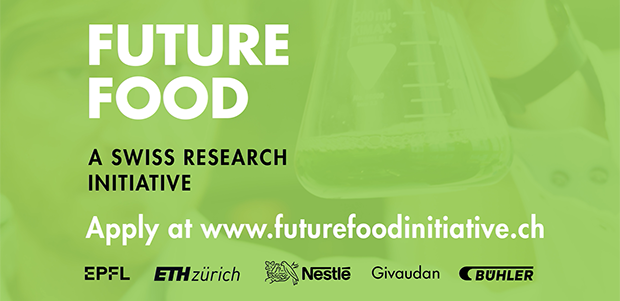 | 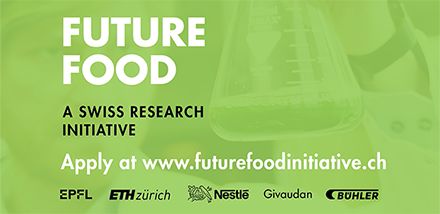 |
| Research |
| Future Food Initiative |
ETH Zurich and EPFL launched the Future Food Initiative in 2018 together with Swiss food industry leaders Bühler, Givaudan, and Nestlé. The goal of the initiative is to expand research and education in the area of food and nutrition sciences. The Future Food Fellowship is a postdoctoral program for exceptionally qualified young researchers who propose projects targeting future food issues, such as plant-based nutrition, the microbiome, climate change mitigation, and healthful nutrition for low income populations. The program currently has eight fellows working on diverse topics. In order to connect, exchange, and explore possibilities for collaboration, visits with industry partners Bühler, Givaudan, and Nestlé took place in October 2020. The exchange occurred both onsite and online, allowing fellows to obtain insights into the different activities of the companies and providing the chance to share their research projects. The call for fellowship applications is now open until 31 March. Learn more about the fellowship and the fellows: www.futurefoodinitiative.ch |
|
|  |
 |
| Research |
| Research Spotlight |
|
Sprouting sustainability: Highlighting innovative research
Research highlights and relevance to stakeholders showcased in new fact sheets on projects focused on sustainably sourced Peruvian Brazil nuts as well as food safety in chicken flocks and sprout seeds.
|
|
|
|
The power of tropical tree diversity
New publications from the member group of Chris Kettle highlight both the peril faced by Brazil nut trees and the power of diversity of tropical tree species to help planetary health.
|
|
|
|
WFSC Research Programs
Loads of updates about project activities funded through the Center‘s Research Programs can be found on project pages.
|
|
|
|
|  |
 |
| Research |
| Bundling Innovations to Transform Agri-Food Systems |
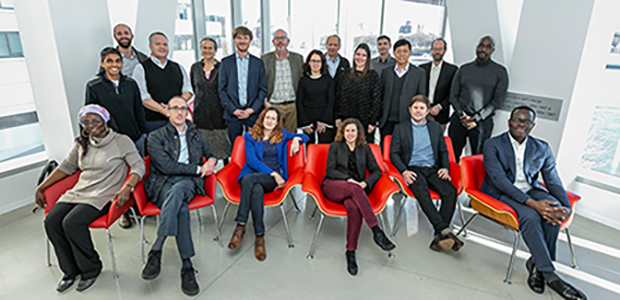 | 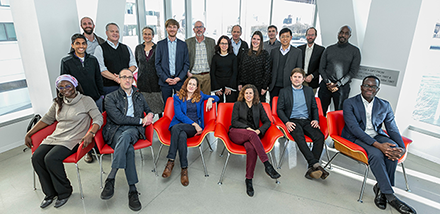 |
The journals Nature Sustainability and Nature Food commissioned the Cornell Atkinson Center for Sustainability to create an expert panel on the topic of Innovations to Build Sustainable, Equitable, Inclusive Food Value Chains. The panel brought together experts from across the globe and spanning diverse disciplines and organizations, including Prof. Alexander Mathys, professor of Sustainable Food Processing at ETH Zurich. The panel met throughout 2019-2020 with the aim to both assess the current state of agricultural-food (agri-food) systems, those relating to the commercial production of food by farming, and identify emergent technologies capable to address the urgent need to transition to more sustainable, equitable, and inclusive agri-food systems. Prof. Mathys supplied expertise on innovations in the areas of alternative proteins, emerging and more sustainable food processing, and multi-indicator sustainability assessment. The Final Report, published 10 December, and its accompanying comment in Nature Sustainability, highlight that technological innovations leading to more sustainable agri-food systems cannot be implemented without enabling market, regulatory, and sociocultural environments. |
|
|
|
|  |
 |
| Research |
| New ETH Zurich Food Systems Professorship |
ETH Zürich, D-USYS, invites applications for the new professorship for Food Systems Economics and Policy. Application Information |
|
|  |
 |
|
|
| Education |
| Professional Course |
The Center will offer its first professional short course this February, in collaboration with the Sustainable Agroecosystems Group of ETH Zurich. The three-day, online course, entitled Designing for Food Systems Resilience: A Circular Approach, aims to teach participants of how to use systemic and transdisciplinary approaches to transform waste into resources, close loops, create shared value and leverage interconnections to design interventions that build resilience. The course also offers the 40 participants a chance to connect with likeminded professionals from around the world and engage in interactive and creative skill building opportunities. The program will provide opportunities to step out of silos, look at the big picture, and understand connections. |
|
|
|
|  |
 |
| Education |
| World Food System Center Alumni Network |
|
Everyone can agree that 2020 required a lot of creativity – also from the World Food System Center Alumni Network (WFSCAN). Due to an increasingly digital collaboration, the number of active alumni has grown and has become more international, and many projects have been implemented and started. After the workshop in January 2020 at Pabhoi Green (Assam, India), a group of six alumni started a crowdfunding campaign. The campaign aimed at supporting Neelam Dutta’s (WFSC alumnus 2015) organic seed and local farmer training initiative at Pabhoi Green, and successfully collected over 40’000 CHF. Other activities organized by the WFSCAN included classes about fermentation and skill building plus a city tour about edible plants. A group of local alumni also eagerly harvested plenty of vegetables and fruits in 2020 from the alumni community garden in Zürich. Further, a group of five alumnae has been formed, highly motivated to learn more about the topic of food justice from a female perspective. To make the topic more visible, they are working on a podcast series. A group of six alumni is also focused on how to improve the support system among the alumni who have active projects or project ideas.
|
|
|
|
|  |
 |
| Outreach |
| Connect and Collaborate: WFSC Research Symposium 2020 |
This year's World Food System Center Research Symposium presented food systems research at ETH Zurich in two distinct online events: Plant Breeding for Global Food Security Webinar and Poster Session and Networking Event. Both events were held on a new interactive platform that allowed for networking in small groups and poster galleries. At the webinar, presentations from World Food System Center Research Programs were featured and gave insight into the applications of plant breeding. The panel discussion further highlighted how the research contributes to the future of plant breeding and its implications for global food security and a planetary health diet. The importance of global collaboration and capacity building were also discussed. Panelists joined from Switzerland ( ETH Zurich, FiBL), Uganda and Colombia ( Alliance Bioversity-CIAT). |
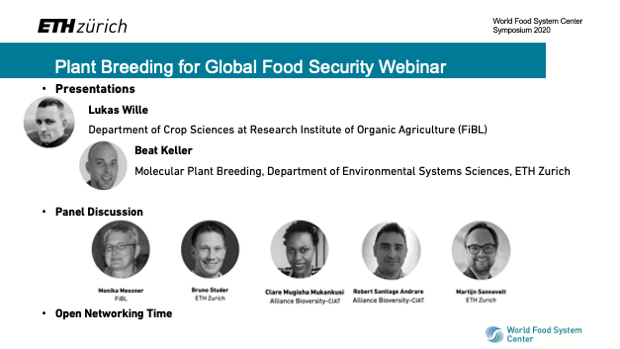 | 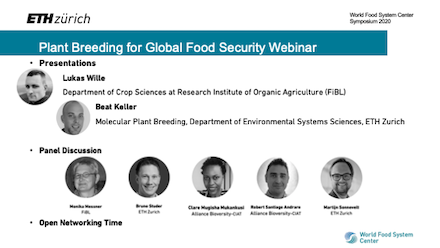 |
|
|
A week before the event, posters highlighting food systems research at ETH Zurich were displayed on Twitter and our website. Poster finalists were invited to present at the event, and five Poster Prize Winners were selected. This event allowed for sharing and connection on food system topics. We congratulate this year’s poster winners, and we thank all presenters for making this networking event a great chance to connect! |
|
|
|
|  |
 |
| Outreach |
| Changing the Food System, One Meal at a Time |
 |  |
What can each consumer do to make a contribution to a more sustainable food system? During the online event ‘ Changing the food system, one meal at a time’ on 26 November 2020, the focus was on cooking while learning more about our food system and exploring a few of the chosen ingredients. Over 270 participants from all over the world joined the event, with over half of those cooking in a team. The guide to cooking a 3-course meal at home was prefaced with inputs on social and environmental challenges in our food system. Michelle Grant (WFSC), gave an introduction to challenges in our food system, then Linn Borgen Nilsen ( NADEL) elaborated on the social aspect of sustainable consumption. Akanksha Singh ( Agricultural Ecology Group at ETH Zurich) then shared insights from her research on intercropping and extolled the many benefits of legumes like beans for both soil quality and nutrition. The cooking then heated up, with Susanne Tobler from TASTELAB introducing the menu. Do you also want to cook your way towards a sustainable future? Watch the webinar and find recipes here |
|
|
|
|  |
 |
| Outreach |
| Pathways for Advancing Pesticide Policies |
In the Nature Food article ‘ Pathways for advancing pesticide policies,’ a consortium of researchers, including several WFSC members, suggest key steps to achieve a reduction in pesticide risks. In a public webinar held on 20 October 2020, several authors of the Nature Food article came together to discuss key challenges and present pathways for advancing European pesticide policies. In presentations and discussions, the panelists, including WFSC members Robert Finger and Bruno Studer, provided insights into selected areas such as best policy practices, new technological approaches, farmer behavior, and efficient policy designs. The webinar had 185 participants. The Webinar was co-hosted by the World Food System Center and the Agricultural Economics and Policy Group of ETH Zurich. More information from the webinar, including presentations and further reading resources can be found here. |
|
|  |
 |
| Member Highlights |
Exciting new interdisciplinary projectsAlexander Mathys granted Swiss National Science Foundation Sinergia project Exploiting the potential of microalgae. A team of researchers from Bern University of Applied Sciences, ETH Zurich, and the University of Cambridge want to encourage more intensive use of microalgae. Rachael Garrett (PI) will be collaborating with William Thompson and Johan Six as well as the Ecovision Lab of Jan Wegner on the recently funded SUSTAIN-COCOA project, part of the European BioDivERsA initiative. The three-year project seeks to evaluate and inform sustainable sourcing policies for biodiversity protection, climate mitigation, and improved livelihoods in the cocoa sector in West Africa. The Ecovision Lab received funding from the Lindt Cocoa Foundation for a new project on assessing the impact of shade tree cover on cocoa yield in Ghana and Ivory Coast using satellite imagery and deep learning, in collaboration with Wilma Hart and Simon Hart at the University of Queensland. Michael Siegrist is part of the EU Horizon 2020 project DECIDE “ Data-driven control and prioritization of non-EU-regulated contagious animal diseases,” which involving 19 partners from 11 countries was recently funded with €10 million. His group is currently looking for a postdoctoral researcher for the project. Johan Six is teaming up with Imperial College London, University of Bergen, Instituto Tecnológico de Santo Domingo (INTEC), University of Exeter, and Sainsbury's, one of the UK's leading supermarkets, to enhance the resilience of the banana supply chain. At the AI for Sustainability session at the Digital Festival Zurich in September 2020, the EcoVision Lab, World Food System Center, and ETH4D highlighted innovative artificial intelligence and machine learning projects that improve food supply chains, diagnose plant health, detect deforestation, and predict flooding disasters. Thijs Defraeye and Andrea Six at EMPA awarded a SNF Agora grant entitled HINT - How fruit & vegetables preserve at home or at your retailer? Bruno Studer, along with Flavio Foiada and Delley Samen of Pflanzen AG, Switzerland, will work together on the Federal Office for Agriculture funded project GESEDON “Genomic selection for low deoxynivalenol content in bread wheat.”
|
Awards and DistinctionsJohan Six, Sonia Seneviratne, and Michael Siegrist were recognized as Highly Cited Researchers 2020 by Web of Science, a designation given to whose publications are among the top one percent of the most frequently cited papers in their field. Jan Dirk Wegner was appointed Associate Professor of Data Science for Sciences at the University of Zurich. Robert Finger joins the Scientific Advisory Board of the IAMO, the Leibniz Institute of Agricultural Development in Transition Economies (Halle, Saale, Germany). Michelle Nay was honored with the SFIAR Award 2020 for her ETH Zurich doctoral project "Improving smallholder farmers’ food security through disease resistant common beans." Niklas Möhring received the SIAF Award of the Swiss Institute of International Studies for his dissertation "Reducing Pesticide Use Risks: An Economic Analysis." Leandro Buchmann from the Sustainable Food Processing Group won an ETH Medal Award 2020 for Outstanding Doctoral Thesis: "Emerging pulsed electric field process development for bio-based applications." Marius Hodel from the Molecular Plant Breeding Group won an ETH Medal Award 2020 for Outstanding Masters Thesis: "Identification and characterization of long terminal repeat retrotransposons in Lolium multiflorum” The ETH Zurich KITE Award 2020 for innovation in teaching was presented to the TdLab team led by Christian Pohl for the course Tackling Environmental Problems. The courses Innovation in Smart Farming and World Food Systems Summer School were also nominated.
In the NewsGrace Crain from the group Plant Nutrition Group featured in Ask the Expert series of ETH News in August: Astrobiologist Grace Crain on the topic of space farming. The research of Grace Crain also featured in November on Swiss SRF 10 vor 10 news program: Space Farming. Research from Grassland Science Ggroup of Nina Buchmann featured in ETH News in September: A difficult year for forests, fields and meadows. Interview with Emma Wetter Slack in ETH News in September: Our research could help to design vaccines for the epidemics of the future. Emma Wetter Slack also featured in ETH podcast: Creating vaccinesResearch from Agricultural Economics and Policy Group of Robert Finger featured in ETH News in November: Governments can curb over-fertilisation.
|
|
|  |
 |
|
|
Several members including Bruno Studer, Peter Edwards, Michael Stauffacher, and Robert Finger contributed to the SCNAT Report: Priority Themes for Swiss Sustainability Research ETH Zukunftsblog Under the topic of sustainability, many of our members post regular contributions to this science blog hosted by ETH Corporate Communications. Read the recent features on holistic pesticide policy and artificial intelligence for agroecology at www.ethz.ch/en/news-and-events/zukunftsblog.html. |
|
|  |
 |
| Recent Food System Publications |
|
Below is a selection of recent publications from WFSC members that highlight their work on food system topics.
|
| • | Ammann, J.; et al. Comparison of two measures for assessing the volume of food waste in Swiss households. 2021. https://doi.org/10.1016/j.resconrec.2020.105295 |
| • | Böcker, L.; et al. Effect of Arthrospira platensis microalgae protein purification on emulsification mechanism and efficiency. 2020. https://doi.org/10.1016/j.jcis.2020.09.067 |
| • | Borrelli, P.; et al. Land use and climate change impacts on global soil erosion by water (2015-2070). 2020. https://doi.org/10.1073/pnas.2001403117 |
| • | Cammelli, F.; et al. Fire risk perpetuates poverty and fire use among Amazonian smallholders. 2020. https://doi.org/10.1016/j.gloenvcha.2020.102096 |
| • | Gharun, M.; et al. Physiological response of Swiss ecosystems to 2018 drought across plant types and elevation. 2020. https://doi.org/10.1098/rstb.2019.0521 |
| • | Gold, M.; et al. Identification of bacteria in two food waste black soldier fly larvae rearing residues. 2020. https://doi.org/10.3389/fmicb.2020.582867 |
| • | Gram, G.; et al. Combining organic and mineral fertilizers as a climate-smart integrated soil fertility management practice in sub-Saharan Africa: A meta-analysis. 2020. https//doi.org/10.1371/journal.pone.0239552 |
| • | Green, A.; et al. Assessing nutritional, health, and environmental sustainability dimensions of agri-food production. 2020. https://doi.org/10.1016/j.gfs.2020.100406 |
| • | Iranshahi K.; et al. Cutting-down the energy consumption of electrohydrodynamic drying by optimizing mesh collector electrode. 2020. https://doi.org/10.1016/j.energy.2020.118168 |
| • | Jung, M.; et al. The apple REFPOP—a reference population for genomics-assisted breeding in apple. 2020. https://doi.org/10.1038/s41438-020-00408-8 |
| • | Kiba, D.I.; et al. A transdisciplinary approach for the development of sustainable yam (Dioscorea sp.) production in West Africa. 2020. https://doi.org/10.3390/su12104016 |
| • | Koh, I.; et al. Climate risks to Brazilian coffee production. 2020. https://doi.org/10.1088/1748-9326/aba471 |
| • | Kronenberg, L.; et al. Rethinking temperature effects on leaf growth, gene expression and metabolism: Diel variation matters. 2020. https://doi.org/10.1111/pce.13958 |
| • | Lee, J.; et al. Simulation of a regional soil nitrogen balance in Swiss croplands. 2020. https://doi.org/10.1007/s10705-020-10078-6 |
| • | Michel, F.; et al. Consumers’ associations, perceptions and acceptance of meat and plant-based meat alternatives. 2021. https://doi.org/10.1016/j.foodqual.2020.104063 |
| • | Ouakoltio, Y.A.; et al. Nitrogen and phosphorus uptake from isotope‐labeled fertilizers by sorghum and soil microorganisms. 2020. https://doi.org/10.1002/agg2.20111 |
| • | Prawiranto K.; et al. Identifying in-silico how microstructural changes in cellular fruit affect the drying kinetics. 2020. https://doi.org/10.1039/D0SM00749H |
| • | Schaub, S.; et al. Tracking societal concerns on pesticides – A Google Trends analysis. 2020. https://doi.org/10.1088/1748-9326/ab9af5 |
| • | Staudacher, P.; et al. Comparative analysis of pesticide use determinants among smallholder farmers from Costa Rica and Uganda. 2020. https://doi.org/10.1177/1178630220972417 |
| • | Walkowiak, S.; et al. Multiple wheat genomes reveal global variation in modern breeding. 2020. https://doi.org/10.1038/s41586-020-2961-x |
| • | Wartenberg, A.C.; et al. Soil fertility and Theobroma cacao growth and productivity under commonly intercropped shade-tree species in Sulawesi, Indonesia. 2020. https://doi.org/10.1007/s11104-018-03921-x |
| • | Wuepper, D.; et al. Countries Influence the Trade-Off between Crop Yields and Nitrogen Pollution. 2020. https://doi.org/10.1038/s43016-020-00185-6 |
| • | Wuepper, D.; et al. Does it matter who advises farmers? Pest management choices with public and private extension. 2020. https://doi.org/10.1016/j.foodpol.2020.101995 |
|
|
|  |
|
|